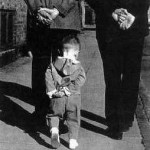In Scripture, are grammar and structure important?
When gathering with the church, have you ever had a discussion about grammar and structure in Scripture? I have… several times. And, the last time this happened was last Sunday when we were studying Ephesians 5.
I know what you’re thinking… “How can a discussion about grammar and sentence structure be edifying to the church?” Well, believe it or not, it can be. In fact, in some cases, it’s important to discuss grammar and sentence structure in order to understand Scripture.
But, in this particular case, we were looking at Ephesians 5:22-33. Of course, this is a very famous passage because everyone wants to argue about what it means for a wife to submit to her husband. (Although, I’ve found it strange that there are very few arguments about what it means for a husband to love his wife… and why there are few – if any – websites or “ministries” devoted to the husband loving the wife. But, I guess that’s a question for another day.)
At one point, I mentioned that Ephesians 5:22 does not include a verb, and that it follows directly from Ephesians 5:21. I also mentioned that Ephesians 5:21 is a participial phrase that is part of the sentence that begins in Ephesians 5:18. In other words, “wives submit to your own husbands” is part of the description of “submitting to one another” which is part of the command “be filled with the Spirit.”
Let’s take this the other way: When Paul writes, “Be filled with the Spirit…” (Ephesians 5:18), he then gives 4 results (at least, I think they are results of being filled with the Spirit – but that’s actually another grammatical question): 1) addressing one another… (Ephesians 5:19a), 2) singing and making melody (Ephesians 5:19b), 3) giving thanks (Ephesians 5:20), and 4) submitting to one another (Ephesians 5:21).
Then, as part of “submitting to one another,” Paul next addresses wives and instructs them to submit to their own husbands as an example (Ephesians 5:22). So, whatever it means to submit to one another, and whatever it means for wives to submit to their husbands (and, yes, we discussed this), it all begins with being filled with the Spirit. (By the way, I didn’t say all of that on Sunday morning, but other people did bring up different grammatical aspects of this passage based on the relationship between Ephesians 5:18, Ephesians 5:21, and Ephesians 5:22.)
What’s interesting is that after we talked about this and continued to the end of the chapter. A few people later wanted to talk about it again. One of the questions that was often brought up is this one: What does it mean that addressing, singing, giving thanks, and submitting all follow from being filled with the Spirit?
So a grammatical / structural question not only led to understanding Scripture better, it also led immediately to encouraging one another about being filled with the Spirit. Plus, it puts the whole discussion about husbands / wives, parents / children, and masters / slaves in a completely different light… because it all begins with being filled with the Spirit.
Scripture… As We Live It #237
This is the 237th passage in “Scripture… As We Live It.”
The one who observes the day Christmas, observes it in honor of the Lord… while the one who abstains or says, “Happy Holidays,” abstains in honor of the Lord and gives thanks to God is a pagan, a heretic, a non-Christian, and an all around bad person. (Romans 14:6 re-mix)
(Please read the first post for an explanation of this series.)
Scripture… As We Live It #236
This is the 236th passage in “Scripture… As We Live It.”
Look carefully then how you walk, not as unwise but as wise, making the best use of the time, because the days are evil. But, of course, the days will be even more evil in about 2000 years. You won’t believe how awful it will be then. (Ephesians 5:15-16 re-mix)
(Please read the first post for an explanation of this series.)
Thankfulness in Scripture – a different look
Have you every thought about the times that Jesus “gave thanks”? What about Paul? Do you know what he was thankful for? Interestingly, when we read about “giving thanks” in Scripture, the context is often quite different from today. And, the things that people were thankful for was often quite different as well. Perhaps we can learn something from looking at times when Jesus and Paul “gave thanks.”
What do you think?
—————————–
When Jesus Was Thankful
He [Jesus] took the seven loaves and the fish, and having given thanks he broke them and gave them to the disciples, and the disciples gave them to the crowds. (Matthew 15:36 ESV; see also Mark 8:6; John 6:11)
And he took a cup, and when he had given thanks he gave it to them, saying, “Drink of it, all of you…” (Matthew 26:27 ESV; see also Mark 14:23; Luke 22:17, 19)
So they took away the stone [from Lazarus’ tomb]. And Jesus lifted up his eyes and said, “Father, I thank you that you have heard me.” (John 11:41 ESV)
—————————–
Why Was Paul Thankful?
First, I thank my God through Jesus Christ for all of you, because your faith is proclaimed in all the world. (Romans 1:8 ESV; see also 1 Corinthians 1:4; Ephesians 1:16; Philippians 1:3; Colossians 1:3; 1 Thessalonians 1:2; 2 Thessalonians 1:3; Philemon 1:4)
Greet Prisca and Aquila, my fellow workers in Christ Jesus, who risked their necks for my life, to whom not only I give thanks but all the churches of the Gentiles give thanks as well. (Romans 16:3-4 ESV)
I thank God that I baptized none of you except Crispus and Gaius, so that no one may say that you were baptized in my name. (1 Corinthians 1:14-15 ESV)
I thank God that I speak in tongues more than all of you. (1 Corinthians 14:18 ESV)
And we also thank God constantly for this, that when you received the word of God, which you heard from us, you accepted it not as the word of men but as what it really is, the word of God, which is at work in you believers. (1 Thessalonians 2:13 ESV)
The secondary concern with imitation in Scripture
As I mentioned in my post “Lessons in Imitation,” the idea of imitation is very important to the authors of the New Testament. This is especially true of Paul, but John (at least) also exhorts his readers toward imitation. In that post, I listed several of the passages in Scripture in which people were exhorted toward imitation. Those instructions included the imitation of God as well as the imitation of other followers of Jesus (both the authors and others).
When we read through those passages, we can see that the primary concern of the authors is for the readers to consider who they are imitating. In this post, I want to consider another concern about imitation that can only be inferred from those passages, and so is a secondary concern.
What concern is that? While the primary concern of the scriptural authors is for the readers to think carefully about who they are imitating, a secondary concern is for the readers to think about the kind of life they are living and that others are imitating.
Now, before I begin, I need to make something clear. We do not live a certain way because other people are watching us (noticing how we live and following our example, either good or bad). Instead, we live a certain way in obedience to Jesus Christ and in order to glorify God. However, while other people ARE watching us, and they ARE following our example whether we realize it or not. And, being a good example (of a follower of Jesus Christ and child of God) is part of obeying Jesus and glorifying God.
But, even before talking about what it means to live in a way that honors Jesus, there’s another step that we need to consider – a step that I think many among the church are setting aside. What step is that? Actually sharing life with others so that they are able to see your life and you are able to see their life.
Think about it… How can you imitate someone if you do not know how that person lives? How can someone imitate your way of life if they do not know how you live? For too long, the church has relied almost completely on words (either spoken or written) as the primary method of teaching and discipleship. This is not sufficient.
We must begin sharing our lives with one another – every aspect of our lives – yes, even the parts that you wish were not there. Why? Because that’s how real discipleship, teaching, and fellowship takes place. Anything else is a farce – a fake – not reality.
Of course, the church today does not accept this kind of messiness… because life is messy. Instead, we prefer to have things polished, practiced, excellent. And, I think, this is stunting the growth of many Christians.
So, start sharing your life with other brothers and sisters in Christ. Let them see the good and the bad. It’s okay, even if they reject you. And some will.
But, others will accept you as you are, and you will be able to accept them as they are. And, together, you will learn to imitate good and stay away from evil, and together you will grow in maturity in Jesus Christ.
The primary concern with imitation in Scripture
As I mentioned in my post “Lessons in Imitation,” the idea of imitation is very important to the authors of the New Testament. This is especially true of Paul, but John (at least) also exhorts his readers toward imitation. In that post, I listed several of the passages in Scripture in which people were exhorted toward imitation. Those instructions included the imitation of God as well as the imitation of other followers of Jesus (both the authors and others).
When we read through those passages, we can see that the primary concern of the authors is for the readers to consider who they are imitating. They are not to accept just anyone as someone to be imitated. And, in fact, there are no indications that they should accept someone else to imitate simply because others are imitating that person.
While the authors do not always specify reasons to imitate someone else, a few do. Perhaps John write the most general exhortation when he writes, “Do not imitate evil but imitate good.” (3 John 11 ESV) If you read that passage in context, you’ll see that John is actually comparing two different examples that could be imitated: Diotrephes or Demetrius.
Similarly, we see Paul exhorted others to follow him “as he follows Christ,” to follow others in suffering, and to follow others in hard work. The author of Hebrews says to follow someone’s “faith” only after considering “the outcome of their way of life.” (Hebrews 13:7 ESV)
Finally, think again about this passage that Paul wrote to the church in Corinth:
I urge you, then, be imitators of me. That is why I sent you Timothy, my beloved and faithful child in the Lord, to remind you of my ways in Christ, as I teach them everywhere in every church. (1 Corinthians 4:16-17 ESV)
So, not only did Paul encourage the Christians in Corinth to imitate him, but he sent Timothy to them as another example to be imitated. This tells us something important about imitation: we should only imitate people we know and spend time with. “Imitation” in Scripture is about following the example of someone else’s way of life, not simply “following” what the person says.
So, in these passages, the authors are exhorting their readers not only to imitate others, but to carefully consider who they are imitating. And, what is to be considered? The way these people live… what they do… how they respond in difficult situation… are they loving, joyful, peace-filled, etc. even when most people are not?
It is only those who are truly following Jesus consistently that should be imitated. This is the primary concern of the authors of Scripture when they tell their readers to imitate others.
Lessons in Imitation
As I’ve mentioned several times lately, we’re studying through Paul’s letter to the church in Ephesus (Ephesians) when we gather together with the church on Sundays. Of course, our discussions usually spill over into times of conversation and encouragement during the week as we see each other in homes, restaurants, parks, wherever.
This last week, we were scheduled to study the first half of chapter 5 together. As I continued studying through the letter and as I focused on chapter 5 last week, I was intrigued by the first few verses of that chapter.
It starts like this:
Therefore be imitators of God, as beloved children. And walk in love, as Christ loved us and gave himself up for us, a fragrant offering and sacrifice to God. (Ephesians 5:1-2 ESV)
I realized when I read this that I had been pretty jaded. Do you understand how shocking it is to be told to “imitate God”? It truly is jarring when you think about it. Of course, Paul followed that up with “walk in love,” and not just any kind of love, but the same love that Jesus Christ demonstrated when he gave up his life for us.
But, going back to that idea of being imitators… there are many instances in Scripture in which the authors exhort the readers to be “imitators.” I started reading through these difference passages, and I was reminded how important imitation is for followers of Jesus Christ.
Here are a few of the passages:
I urge you, then, be imitators of me. That is why I sent you Timothy, my beloved and faithful child in the Lord, to remind you of my ways in Christ, as I teach them everywhere in every church. (1 Corinthians 4:16-17 ESEV)
Be imitators of me, as I am of Christ. (1 Corinthians 11:1 ESV)
And you became imitators of us and of the Lord, for you received the word in much affliction, with the joy of the Holy Spirit, so that you became an example to all the believers in Macedonia and in Achaia. (1 Thessalonians 1:6-7 ESV)
For you, brothers, became imitators of the churches of God in Christ Jesus that are in Judea. For you suffered the same things from your own countrymen as they did from the Jews… (1 Thessalonians 2:14 ESV)
For you yourselves know how you ought to imitate us, because we were not idle when we were with you, nor did we eat anyone’s bread without paying for it, but with toil and labor we worked night and day, that we might not be a burden to any of you. It was not because we do not have that right, but to give you in ourselves an example to imitate. (2 Thessalonians 3:7-9 ESV)
And we desire each one of you to show the same earnestness to have the full assurance of hope until the end, so that you may not be sluggish, but imitators of those who through faith and patience inherit the promises. (Hebrews 6:11-12 ESV)
Remember your leaders, those who spoke to you the word of God. Consider the outcome of their way of life, and imitate their faith. (Hebrews 13:7 ESV)
Beloved, do not imitate evil but imitate good. Whoever does good is from God; whoever does evil has not seen God. (3 John 1:11 ESV)
While most of these examples are from Paul’s letters, at least one is from a different author. (Perhaps two are fum a different author, if Hebrews was not written by Paul.) In fact, the most general exhortation is from John when he writes, “Do not imitate evil, but imitate good.”
So, why do you think imitation was so important to these early followers of Jesus?
Scripture… As We Live It #235
This is the 235th passage in “Scripture… As We Live It.”
Give thanks in all circumstances just before you eat a meal (especially if you eat in a restaurant) and on a special day set aside for giving thanks; for this is the will of God in Christ Jesus for you. (1 Thessalonians 5:18 re-mix)
(Please read the first post for an explanation of this series.)
The City Gates and Other Community Gatherings
As I explained in my post “The Church, the Synagogue, and the City Gates,” at least one scholar has concluded that the Jewish synagogue finds its origin in the community activities related to the “city gates” instead of the worship activities related to the temple. Since the early followers of Jesus Christ were greatly influenced by their experiences as part of the first century synagogue, understanding how the synagogue began and what types of activities happened as part of the synagogue can help us also understand the early church.
The gates of various cities are mentioned many times in Scripture. Often, people are said to pass into or out of the gates. Thus, the gates simply represent access to a city. In other passages, gates are said to be barred or fortified, representing the protection or defense of the city. Also, I’ve looked at a few passages in which the king sat on his throne at the gates of the city and other passages in which elders of the community sat at the city gates. I also looked at community legal issues which were associated with the city gates. In this post, I look at examples of other community gatherings in the city gates.
So far, each of the examples have shown some type of community gathering in the city gates. Here are some examples of other community gatherings in the gates that don’t fall into the other categories (king, elders, legal issues):
As soon as he mentioned the ark of God, Eli fell over backward from his seat by the side of the gate, and his neck was broken and he died, for the man was old and heavy. He had judged Israel forty years. (1 Samuel 4:18 ESV)
Then Saul approached Samuel in the gate and said, “Tell me where is the house of the seer?” (1 Samuel 9:18 ESV)
And Absalom used to rise early and stand beside the way of the gate. And when any man had a dispute to come before the king for judgment, Absalom would call to him and say, “From what city are you?” And when he said, “Your servant is of such and such a tribe in Israel,” Absalom would say to him, “See, your claims are good and right, but there is no man designated by the king to hear you.” Then Absalom would say, “Oh that I were judge in the land! Then every man with a dispute or cause might come to me, and I would give him justice.” (2 Samuel 15:2-4 ESV)
When I went out to the gate of the city,
when I prepared my seat in the square,
the young men saw me and withdrew,
and the aged rose and stood;
the princes refrained from talking
and laid their hand on their mouth;
the voice of the nobles was hushed,
and their tongue stuck to the roof of their mouth. (Job 29:7-10 ESV)
There are many other passages which mention the gates of various cities in many different cultures. Many of these are related to the health and welfare of the community. We can see that the people of the city took care of many different community issues in the city gates. (It’s interesting that Job 29:7 associates “the gate of the city” with “my seat in the square” – with some translations preferring “my seat in the street.”)
If the synagogue originated in the activities that took part in the “city gates” of ancient cities, and if the early Christians carried over many of these activities into their own gatherings, then we could expect the church (especially the ones which included many Jewish believers) would include this same focus on community activities.
The City Gates and the Elders of the Community
As I explained in my post “The Church, the Synagogue, and the City Gates,” at least one scholar has concluded that the Jewish synagogue finds its origin in the community activities related to the “city gates” instead of the worship activities related to the temple. Since the early followers of Jesus Christ were greatly influenced by their experiences as part of the first century synagogue, understanding how the synagogue began and what types of activities happened as part of the synagogue can help us also understand the early church.
The gates of various cities are mentioned many times in Scripture. Often, people are said to pass into or out of the gates. Thus, the gates simply represent access to a city. In other passages, gates are said to be barred or fortified, representing the protection or defense of the city. Also, I’ve looked at a few passages in which the king sat on his throne at the gates of the city. In this post, I look at the relationships between the elders of a community and the city gates.
There are many passages in the Old Testament in which the elders of a city are said to be gathered “at the gates” of that city. Here are a few of the passages:
And if the man does not wish to take his brother’s wife, then his brother’s wife shall go up to the gate to the elders and say, “My husband’s brother refuses to perpetuate his brother’s name in Israel; he will not perform the duty of a husband’s brother to me.” (Deuteronomy 25:7 ESV)
[The man who committed manslaughter] shall flee to one of these cities [of refuge] and shall stand at the entrance of the gate of the city and explain his case to the elders of that city. Then they shall take him into the city and give him a place, and he shall remain with them. (Joshua 20:4 ESV)
Then all the people who were at the gate and the elders said, “We are witnesses. May the LORD make the woman, who is coming into your house, like Rachel and Leah, who together built up the house of Israel. May you act worthily in Ephrathah and be renowned in Bethlehem…” (Ruth 4:11 ESV)
Her husband is known in the gates when he sits among the elders of the land. (Proverbs 31:23 ESV)
So, we see that the elders of the city are said to be sitting “in the gates” of that city. But, who were the elders of a city? To begin with, we should recognize that this idea of “elders” is not really related to the Law of Moses. Instead, many different cultures and societies gave place in their community to the older people of the community. Even in Scripture we find “elders” in Egypt (Genesis 50:7), Midian (Numbers 22:4), and Moab (Numbers 22:7) for example.
These were the older men in the community, respected members of society. These were the people that the others in the community would turn to when they needed advice or counsel or when there were problems or legal matters to deal with. And, the elders (along with others) would gather at the city gates to take care of these community issues.
What can we learn about the “city gates,” the synagogue, and the church from these passages?








